Functions Questions and Answers

Math
FunctionsLet f(x) = x+2/x-4 and and g(x) = 10x-22/x²-5x+4
Simplify f(x) - g(x): ____________
The values of x that need to be excluded from the domain of the difference function are x = _______

Math
FunctionsThe function g(2) is shown in the table below.
x g(x)
-2 -11
-1 -8
0 -5
1 -2
2 1
Which of the following tables represents the inverse function, g‾¹(x)?

Math
FunctionsThe function h(x)= (x+2)³ can be expressed in the form f(g(x)), where f(x)= x³, and g(x) is defined below:
g(x)=____

Math
FunctionsRefer to the functions r, p, and q. Find the function
r(x) = 5x
Part: 0/2
Part 1 of 2
Part: 1 / 2
Part 2 of 2
p(x)=x² + 8x
The domain of
5x
2-x
5
X
• (²) (x)
(x) in interval notation is
q
q (x) = √2-x
0/0
(x) and write the domain in interval notation.
8
-8
(0,0)

Math
FunctionsFor each of the following, find the formula for an exponential function that passes through the two points given.
a. (0,8) and (3, 216)
f(x) =
b. (0,6860) and (3,20)
g(x) =

Math
FunctionsLet f(x) = 5x²-3x and g(x)=x²-x+3. Find (f+g)(x), (f-g)(x), (fg)(x), and A
(f+g)(x) = 6x² - 4x +3 (Simplify your answer.)
(f-g)(x) = (Simplify your answer.)
(x). Give the domain of each.


Math
FunctionsUse the intercepts to graph the equation.
x = -1
x-intercept: Enter as a coordinate: such as (a, b). If there is no x- intercept, enter DNE.
y-intercept:
intercept, enter DNE Enter as a coordinate: such as (a, b). If there is no y-

Math
FunctionsThe graph of the cosine function has been vertically compressed by a factor of reflected in the y-axis, has a period of 720°, has been shifted left 60°, and has been shifted up 5. Write the equation of this function.

Math
FunctionsSimplify the expression y² + 4y / y²-16 and give your answer in the form of f(y) / g(y) Your answer for the function f(y) is : Your answer for the function g(y) is :

Math
FunctionsAt 12:00 P.M. the volume of water in a tank started changing steadily over time. The volume V measured in gallons, ₺ minutes after the water volume started to change is given by the equation
V = 9200 - 4.6t .
The equation tells us that the volume of water in the tank was initially __ gallons, and that the volume is __

Math
FunctionsGiven two functions f(x) = √1 - x) / 2 and g(x) = √1 + x) / 2
If x = 2√2)/ 3, find
f(x) =
g(x) =
f(x) / g(x) =

Math
FunctionsCompute the first-order central difference approximation of O(h^4) at x=0.5 using a step size of h=0.25 for the following function
f(x) =(a +b +c)x^3 + (b +c +d)x –(a +c +d)
Compare your result with the analytical solution.
a=1, b=7, c=2 , d =4

Math
FunctionsGiven 2 exponential functions, discuss all their features (Domain, range, increasing/decreasing, the equation of the asymptote, the x- and y-intercepts, their steepness) and highlight all the similarities and differences between them

Math - Others
FunctionsGiven the function y = 4(3)‾(ˣ ⁺ ²) – 7, choose all the transformations of this function to the parent function of y= 3ˣ .
a. Reflected across the y-axis, a horizontal stretch by a factor of 4 right 2, and down 7.
b. Reflected across the x-axis, a vertical stretch by a factor of 4, up 2, and left 7.
c. Reflected across the x-axis, a horizontal stretch by a factor of 4, left 2, and down 7.
d. Reflected across the y-axis, a vertical stretch by a factor of 4, left 2, and down 7.

Math
FunctionsA function that converts dress sizes in the United States to those in Europe is given by D = f(x) = 2x + 24 where is the size in the United States.
a. Find the European dress size that corresponds to a U.S. dress size of = 10.
b. Find the function that converts European dress size to U.S. dress size.
x = ƒ-¹(D) =
c. Use part b. to find the U.S. dress size that corresponds to a Europen dress size 62.

Math
FunctionsDetermine all important features, and sketch a complete graph of
ƒ(x)=(5x–10)/(x²+8x-20)

Math
FunctionsWrite an exponential function y= abˣ whose graph passes through (1, 3) and (3, 75).
a y = 0.6(x⁵)
b y = 5(0.6ˣ)
c y = 0.6(36ˣ)
d y = 0.6(5ˣ)

Math
FunctionsWhich of the following functions are linear?
a. y = 4x² +3
b. 2x + 4y = 14
c. y = 1/x +5
Select all that apply.
A. y = 4x² +3
B. y= 1/x +5
C. 2x + 4y= 14

Math
FunctionsSolve y=f(x) for x. Then find the input(s) when the output is -7.
f(x) = 5/9 x+2
a x= 9y-2 /5 ; -13
b x= 9y-18 / 5 ; -81/5
c x= 9y/5 -2 ; -73/5
d x= -5/9 y -2 ; 17/9

Math
FunctionsDecide whether f is even, odd, or neither. f(x)=x²-3x² +6
Choose the correct statement.
A. The function is even.
B. The function is odd.
C. The function is neither even nor odd.

Math
FunctionsSuppose the monthly cost for the manufacture of golf balls is C(x) = 3310 + 0.51x, where x is the number of golf balls produced each month.
a. What is the slope of the graph of the total cost function?
b. What is the marginal cost (rate of change of the cost function) for the product?
c. What is the cost of each additional ball that is produced in a month?
a. What is the slope of the graph of the total cost function?
b. What is the marginal cost (rate of change of the cost function) for the product?
c. What is the cost of each additional ball that is produced in a month?

Math
FunctionsThe value of a particular investment follows a pattern of exponential growth. In the year 2000, you invested money in a money market account. The value of your investment t years after 2000 is given by the exponential growth model A-9,1000056 By what percentage is the account increasing each year?
A 6.1%
B. 6.2%
C. 5.7%
D. 5.9%

Math
FunctionsDetermine if the following equation has x-axis symmetry, y-axis symmetry, origin symmetry, or none of these.
2x + y² = -4
x-Axis Symmetry
y-Axis Symmetry
Origin Symmetry
None of these

Math
FunctionsThe total number of sales of a spy novel is modeled by the function f(x) 16,918(1.028). If the initial total number of sales (that is, the total number of sales when
X = 0) was measured January 1, 2013, what will the total number of sales be on January 1, 2028? Round your answer to the nearest whole number, if necessary.
Answer
How to enter your answer (opens in new window)

Math
FunctionsSolve each exponential equation. Use a calculator to write the answer in decimal form (to at least 4 decimal places).
a. 3^x = 4
x=
b. 4^x = 3
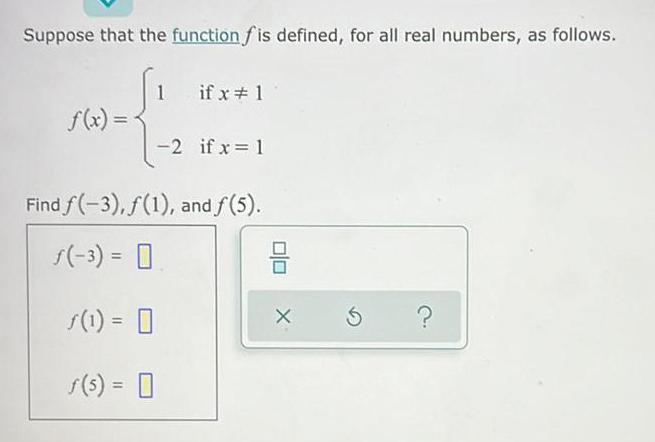
Math
FunctionsSuppose that the function fis defined, for all real numbers, as follows.
f(x) = 1 if x ≠1
-2 if x = 1
Find f(-3), f(1), and ƒ (5).
ƒ(-3) =
f(1) =
ƒ(5) =

Math
FunctionsFrom 2008 through 2012, the function y-035x +98 can be used to approximate the movie box office (in billions of dollars) in region A while the function
y =0.9x+6.5 approximates the box office in region B. For both regions, x represents the number of years since 2008
a. If these trends continue, predict the year in which the region A box office and region B box office will be the same
b. Use these equations to predict the box office for region A and region B for the year 2016
a. In year region A box office and the region B box office will be the same
(Round to the nearest year)
b. The box office for region A in 2016 will be $ billion
(Type an integer or a decimal)
The box office for region B in 2016 will be 5 billion
(Type an integer or a decimal)
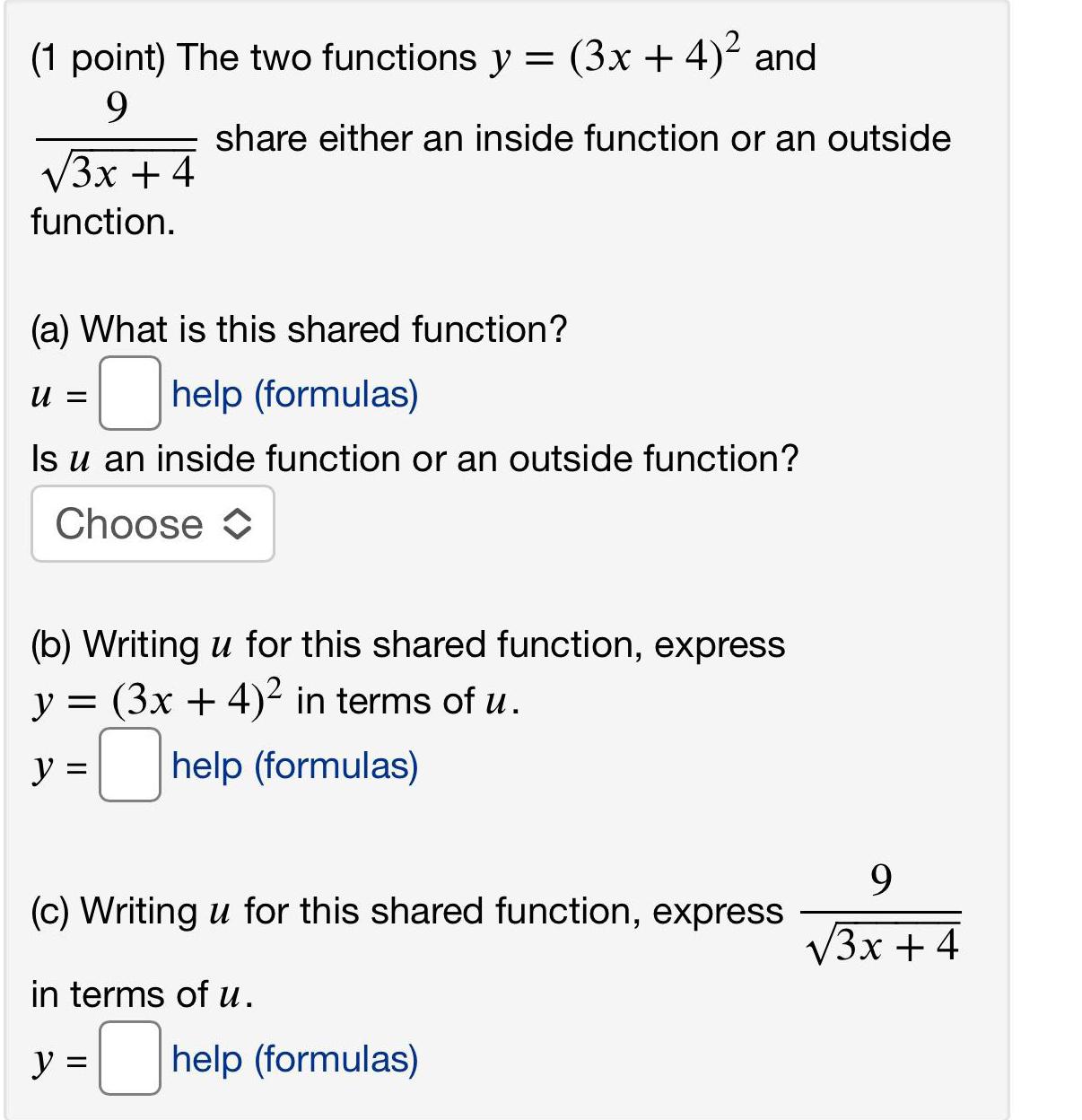
Math
FunctionsThe two functions y = (3x + 4)² and 9/√3x + 4 share either an inside function or an outside function.
(a) What is this shared function?
u = help (formulas)
Is u an inside function or an outside function?
(b) Writing u for this shared function, express y = (3x + 4)² in terms of u.
y = help (formulas)
(c) Writing u for this shared function, express 9/√3x + 4 in terms of u.
y = help (formulas)
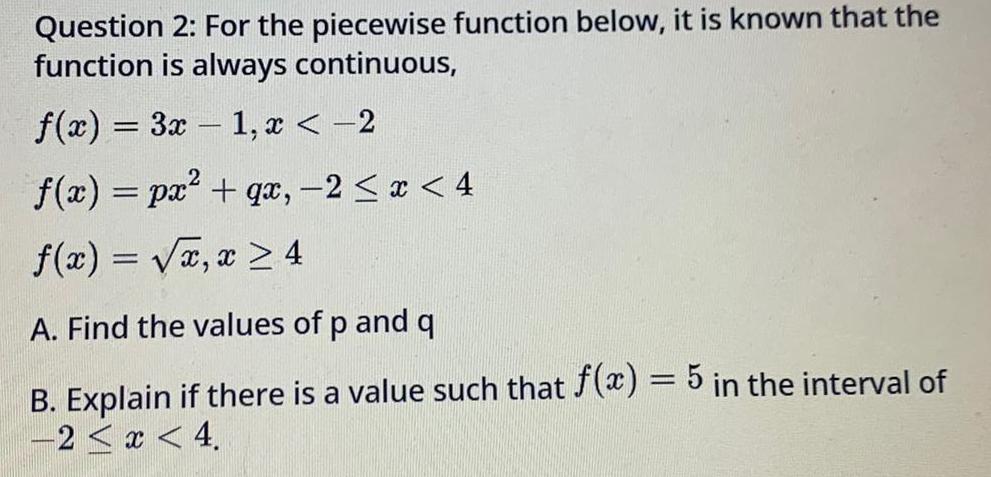
Math
FunctionsFor the piecewise function below, it is known that the function is always continuous,
f(x) = 3x - 1, x < -2
f(x) = px² + qx, -2 ≤ x < 4
f(x)=√x, x ≥ 4
A. Find the values of p and q
B. Explain if there is a value such that f(x) = 5 in the interval of -2 ≤ x < 4.
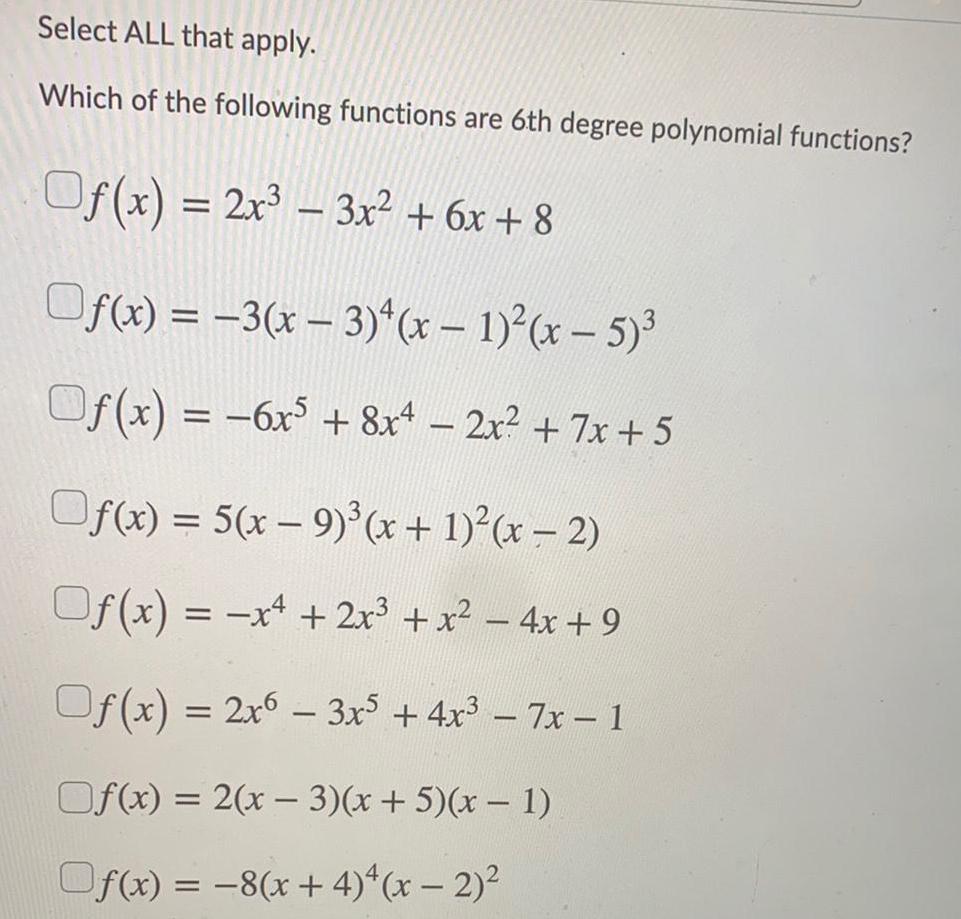
Math
FunctionsSelect ALL that apply.
Which of the following functions are 6th degree polynomial functions?
f(x) = 2x³ − 3x² + 6x +8
f(x) = -3(x-3)(x - 1)²(x - 5)³
ƒ (x) = −6x^5 + 8x^4 − 2x² + 7x + 5
f(x) = 5(x - 9)³ (x + 1)²(x − 2)
f(x) = -x² + 2x³ + x² - 4x +9
f(x) = 2x^6 - 3x³ + 4x³ - 7x - 1
f(x) = 2(x − 3)(x + 5)(x - 1)
f(x) = -8(x+4)^4 (x - 2)²
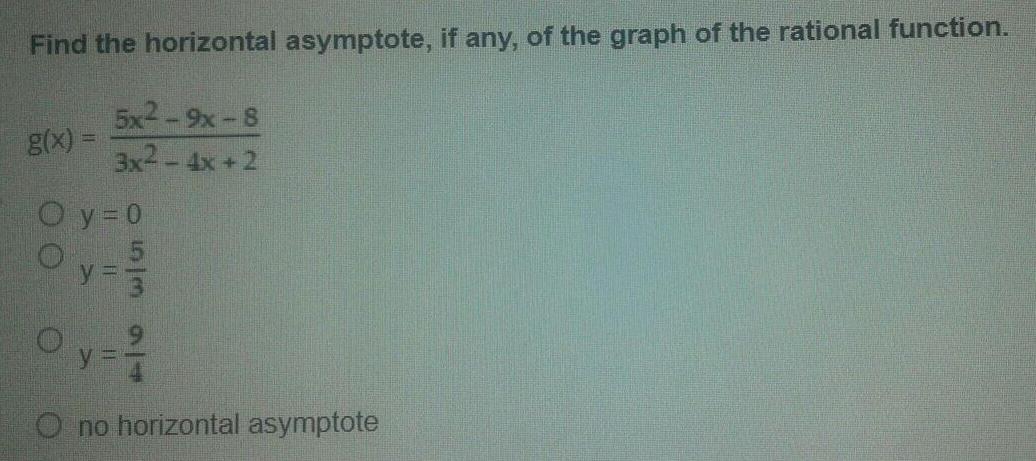
Math
FunctionsFind the horizontal asymptote, if any, of the graph of the rational function.
g(x) =5x2-9x-8/3x² - 4x + 2
y = 0
y = 5/3
y=9/4
no horizontal asymptote
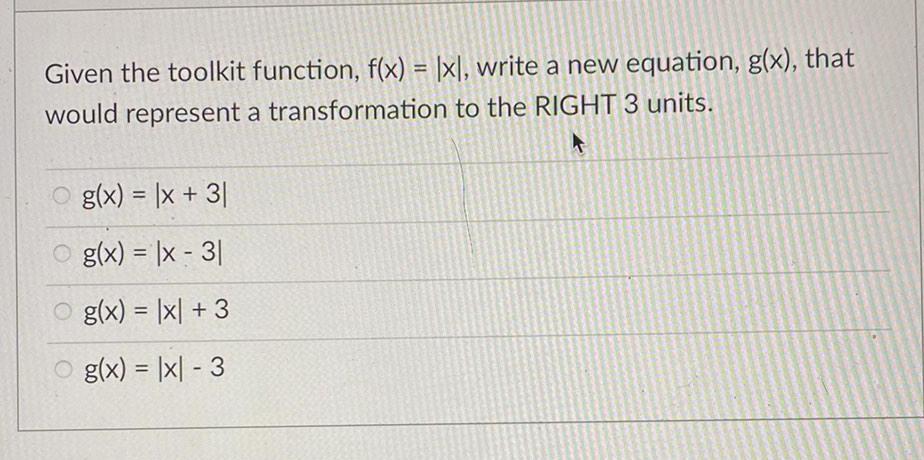
Math
FunctionsGiven the toolkit function, f(x) = |x|, write a new equation, g(x), that
would represent a transformation to the RIGHT 3 units.
g(x) = |x + 3|
g(x) = |x - 3|
g(x) = |x| +3
g(x) = |x - 3

Math
FunctionsA pharmaceutical corporation has two plants that produce the same over-the-counter medicine. If x₁ and x₂ are the numbers of units produced at plant 1 and plant 2, respectively, then the total revenue for the product is given by
R = 160x₁ + 160x₂ - 2x₁² - 4x₁x₂ - 2x₂². When x₁ = 11 and x₂ = 7, find the marginal revenue for plant 1, ƏR/0x₁, and the marginal revenue for plant 2, 3R/3x2.
(a) Find the marginal revenue for plant 1, 3R/3x₁.
(b) Find the marginal revenue for plant 2, ƏR/0x₂.

Math
FunctionsLet f(x)=2x-5. g(x)=x2, and h(x) = 3x + 4. Perform the indicated composition.
f(g(x)) =

Math
FunctionsRecall that profit equals revenue minus cost. For the revenue and cost functions shown, answer parts (a) through (e) below.
R(x) = 420x-2x² and C(x) = 100x + 10,880, with 0≤x≤ 150
(a) Find the break-even point.
The break-even point(s) is (are) x =
(Type an integer or decimal rounded to one decimal place as needed. Use a comma to separate answers as needed.)


Math
FunctionsFind the values of c and d if the trinomial
x² + 20x + c
can be factored as
(x + d)²
c =
d=

Math
FunctionsFill in the blanks below in order to justify whether or not the mapping shown
represents a function.
The mapping diagram above a function since where there

Math
FunctionsA sample of 650 grams of radioactive substance decays according to the function A(t)= 650e ^028t, where t is the time in years. How much of the substance will be left in the sample after 10 years? Round your answer to the nearest whole gram.

Math
FunctionsSolve the following equation for x and assume a, b, c > 0.
|x-a| = |bx - cl.
b) Solve the following inequality for x and assume a, b > 0.
|x - a| <b/|x + al
c) The relationship between Celsius and Fahrenheit temperature scale is given by C = (F - 32) where C is the temperature in degrees Celsius and F is the temperature in degrees Fahrenheit. What is the interval in Celsius scale that corresponds to the temperature range 59 ≤ F≤ 86?
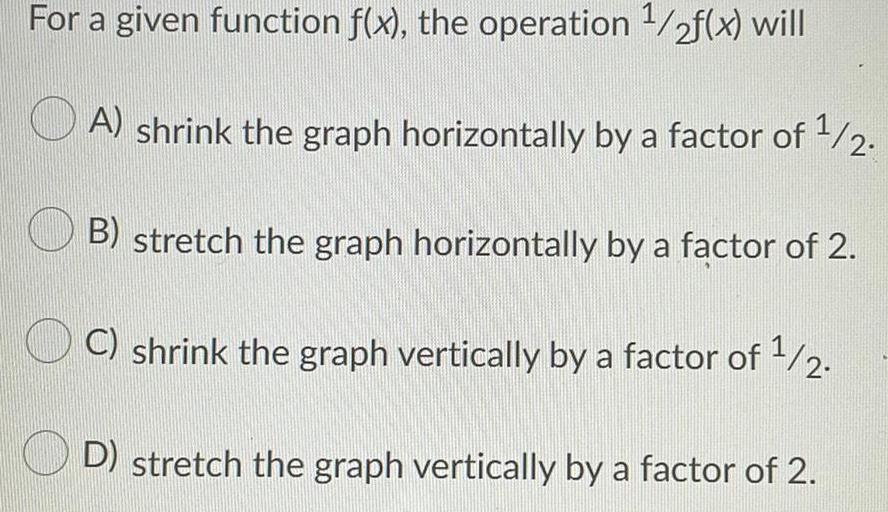
Math
FunctionsFor a given function f(x), the operation 1/2f(x) will
A) shrink the graph horizontally by a factor of 1/2.
B) stretch the graph horizontally by a factor of 2.
C) shrink the graph vertically by a factor of 1/2.
D) stretch the graph vertically by a factor of 2.
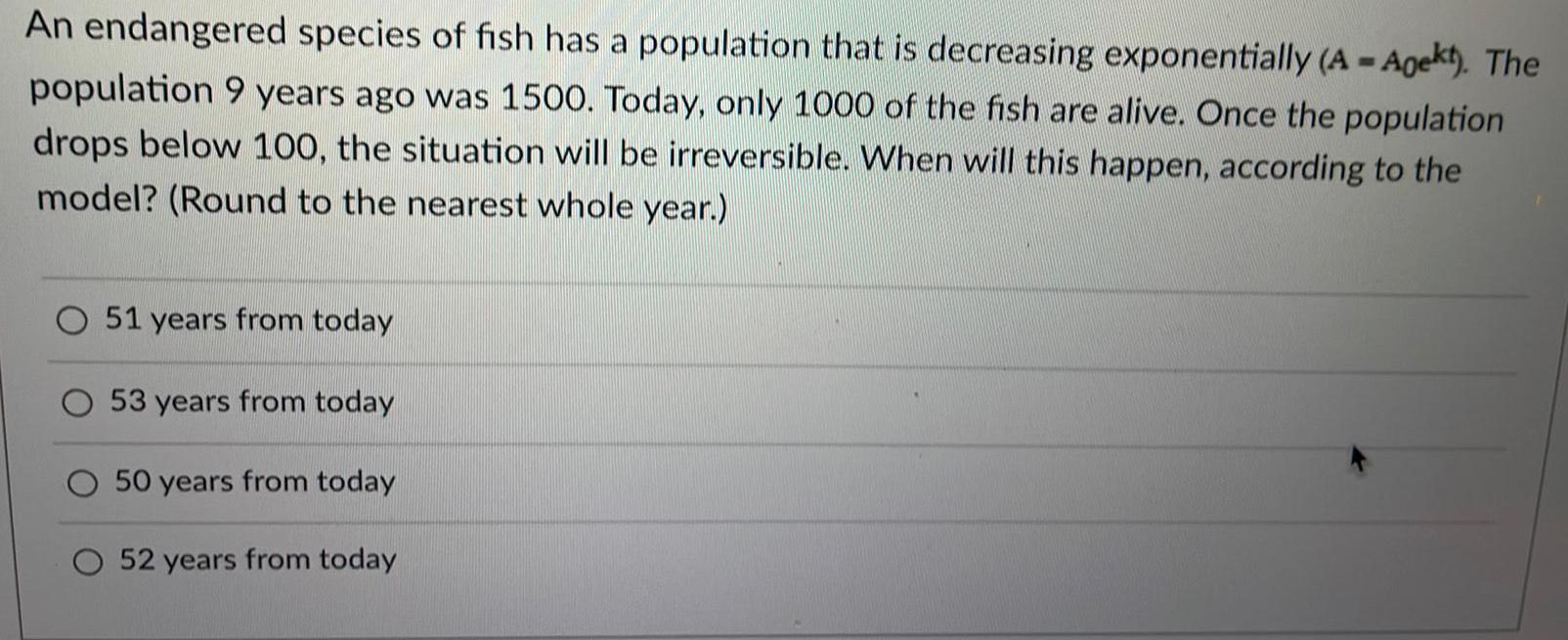
Math
FunctionsAn endangered species of fish has a population that is decreasing exponentially (A - Agekt). The
population 9 years ago was 1500. Today, only 1000 of the fish are alive. Once the population
drops below 100, the situation will be irreversible. When will this happen, according to the
model? (Round to the nearest whole year.)
51 years from today
53 years from today
50 years from today
52 years from today
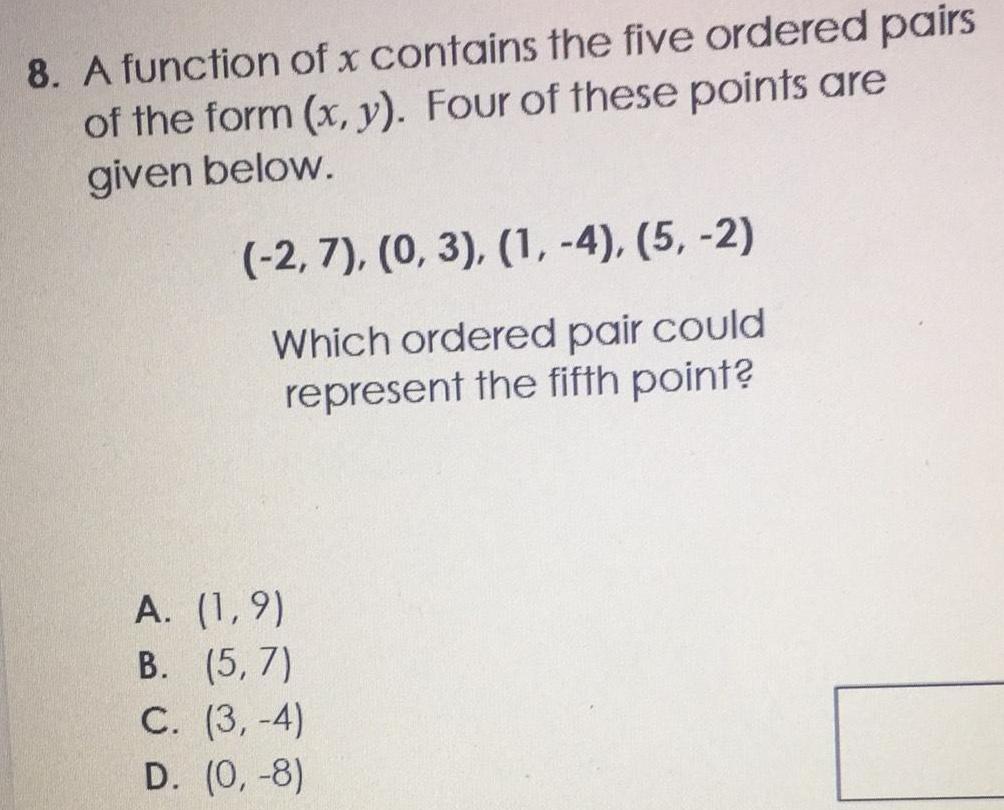
Math
FunctionsA function of x contains the five ordered pairs
of the form (x, y). Four of these points are
given below.
(-2, 7), (0, 3), (1, -4), (5,-2)
Which ordered pair could
represent the fifth point?
A. (1,9)
B. (5,7)
C. (3,-4)
D. (0, -8)

Math
FunctionsGiven the function g(x) y, which of the following statements is true?
g(x) is the name of the function, is the dependent variable, and y is the independent variable.
g is the name of the function, a is the dependent variable, and y is the independent variable.
g(x) is the name of the function, is the input variable, and y is the output variable.
g is the name of the function, is the input variable, and y is the output variable.
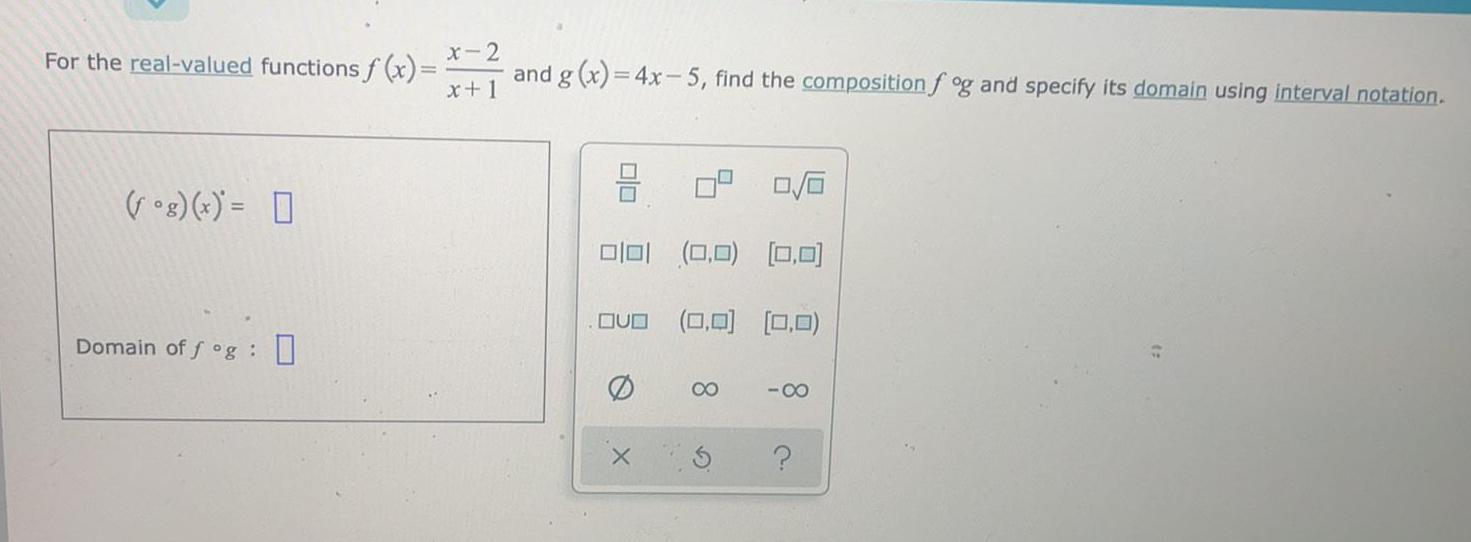
Math
FunctionsFor the real-valued functions f(x)=x-2/x+1 and g(x)=4x-5, find the composition fog and specify its domain using interval notation.
(fog)(x)'=
Domain of fog :
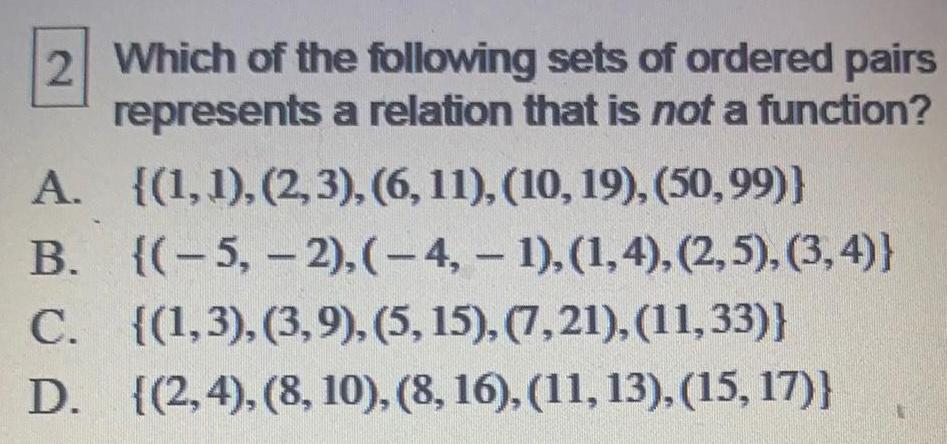
Math
Functions2 Which of the following sets of ordered pairs
represents a relation that is not a function?
A.{(1, 1), (2,3), (6, 11), (10, 19), (50,99)}
B.{(-5, -2), (-4,-1), (1,4), (2,5), (3,4)}
C.{(1,3), (3, 9), (5, 15), (7, 21), (11,33)}
D. {(2,4), (8, 10), (8, 16), (11, 13), (15, 17)}


Math
FunctionsDescribe the function f(x) = 5(1/3)^x.
O It is an exponential decay function with a base of 1/3 and a y-intercept at y=5.
O It is an exponential growth function with a base of 5 and a y-intercept at y=1/3

Math
FunctionsIf f(x) is a function, how is the graph of g(x)=4f(x-1) different from the graph of f(x)?
O g(x) has the same shape as f(x) but stretched vertically by a factor of 4 and shifted right I space.
O g(x) has the same shape as f(x) but shifted up 4 spaces and shifted left 1 space.
Og(x) has the same shape as f(x) but stretched horizontally by a factor of 4 and shifted down 1 space.
O g(x) has the same shape as f(x) but the vertex has been transformed to the point (-1, 4).